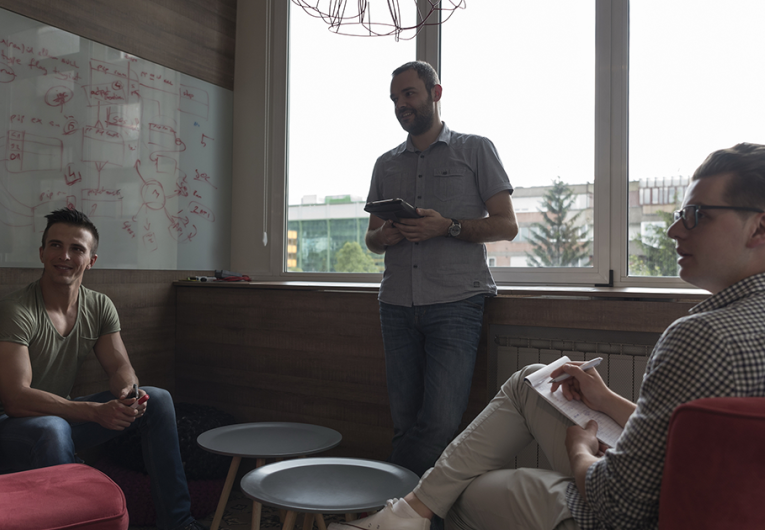
Is Your Multitasking Really Working – For Your Business?
Small business owners are understandably drawn to multitasking. There’s just so much work to get done when you’re running a company – and if you’re a solopreneur, no one to delegate it to. Plus, technology practically begs you to tackle more than one thing at a time.
You may even think you’re good at it, successfully multitasking every day, writing an email while you talk on the phone, etc. But is multitasking all it appears to be?
Research says, not really.
Your Brain and Multitasking
Multitasking is a “powerful and diabolical illusion,” says neuroscientist Daniel J Levitin in his book, “The Organized Mind: Thinking Straight in the Age of Information Overload.”
He points to insight from MIT neuroscientist Earl Miller, who says the human brain is not wired to multitask well. When people think they’re multitasking, they’re actually just switching from one task to another very rapidly. And every time they do, Miller says, there’s a cognitive cost.
“So we’re not actually keeping a lot of balls in the air like an expert juggler,” writes Levitin in an excerpt from his book published in The Guardian in an article, “Why the Modern World is Bad for Your Brain.”
“We’re more like a bad amateur plate spinner, frantically switching from one task to another, ignoring the one that is not right in front of us but worried it will come crashing down any minute.”
Why You Should Rethink Multitasking
As appealing as multitasking is, small business owners might want to rethink doing or trying to do so many things at once.
Here are 3 reasons why you should fight the urge to multitask.
Quality of Work Suffers
As a general rule, your mind can only effectively focus on one task of the same type at a time, says clinical psychologist Natalia Peart in a blog by Terri Williams on MultiBriefs, which publishes industry-specific news briefs for association members and trade professionals.
"So, despite what we all think, we’re not good at doing two things that require the same brain attention at the same time," says Peart, founder and CEO of Catalyst Innovation Group, and author of "FutureProofed: How to Navigate Disruptive Change, Find Calm in Chaos, and Success in Work and Life."
When you’re composing an email or replying to messages while you’re on the phone, for example, you’re not actually “multitasking,” she says. “What you’re really doing is typing part of an email, then stopping and switching to your phone conversation, then stopping and returning to your email, and so on."
"This is really considered serial tasking in rapid succession, not multitasking," she explains in the MultiBrief article.
Not only will it take you longer to finish, Peart says, you won’t be as accurate, since you’re taxing your brain by constantly refocusing with all of the switching back and forth.
Increases stress
Multitasking has been found to increase the production of the stress hormone cortisol as well as the fight-or-flight hormone adrenaline, which can overstimulate your brain and cause mental fog or scrambled thinking, according to the neuroscientist Levitin.
“Multitasking creates a dopamine-addiction feedback loop, effectively rewarding the brain for losing focus and for constantly searching for external stimulation,” writes Levitin in The Guardian article. “To make matters worse, the prefrontal cortex has a novelty bias, meaning that its attention can be easily hijacked by something new – the proverbial shiny objects we use to entice infants, puppies, and kittens.”
He calls it the “ultimate empty-caloried brain candy. “Instead of reaping the big rewards that come from sustained, focused effort, we instead reap empty rewards from completing a thousand little sugar-coated tasks.”
It’s Actually Counterproductive
That feeling you’re getting a lot done when you’re multitasking is misleading, says Levitin. “...Ironically, multitasking makes us demonstrably less efficient,” he writes.
Many other experts agree.
Your IQ actually drops 10 points when you’re multitasking, according to research from the University of London’s Institute of Psychiatry. And that’s one reason it can be counterproductive. A lack of focus can result in errors, which will mean you’ll later need to take the time to correct the work, therefore eliminating any “multitasking” efficiency.
Further, researchers from the National Academy of Sciences found that those who really pile it on – what they called “heavy multitaskers” – are actually getting less done than the “light multitaskers.”
“Heavy multitaskers are so consumed with the act of juggling tasks that they’re easily distracted by irrelevant information,” says the NAS study.
A Stanford University research that studied people who frequently multitask and think they’re excellent at it found that the shifting back and forth negatively impacts their ability to distinguish between important and irrelevant information. Over time, they can’t even focus when they’re not multitasking, the study found.
When you’re adding tasks on for the brain to try to focus on, Peart says, it can cause performance on each task to deteriorate.
"And once you have been distracted from the original task, it takes the brain as long as 15 minutes to refocus," the clinical psychologist in the MultiBriefs blog. "Not only are you less — instead of more — productive, but your long-term memory and creativity can also be reduced."
The trends, insights, and solutions you need to grow your business.
By signing up, you’re subscribing to our monthly email newsletter, The
Wire. You may unsubscribe at any time.
Your information stays safe with us. Learn more about our privacy
policy.











![[#MSP_NAME#] Logo](/themes/sparklight_business/images/transition-logos/migration-banner-logo-[#MSP_CD#].png)
